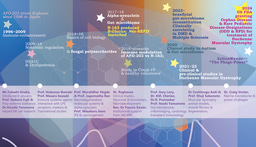Leveraging the Gut microbiome to manage from neurodevelopmental to neurodegenerative illnesses
Published in Bioengineering & Biotechnology

Complexities of the central nervous system was one of the reasons, we haven't got much insight into ways and means of managing the diseases of the brain since its development through aging, which probably could have triggered the research of an indirect insight of studying the influence of Gut Microbiome (GM) on brain. Gut-brain-axis being the harbinger of further research and evolution of gut-multiorgan-axes, the functional diseases of the brain due to its chemically driven psychological and psychiatric effects is another important phenomenon that has more relevance to the GM.
A beneficial manipulation of the GM has been through either a probiotic dose of "good" GM or a Fecal Microbiome Transplant (FMT) which again is of "good" GM. However, a much fundamental and safe approach through a prebiotic when could yield the control of Enterobacteriaceae, the "bad" GM (1) which correlated with an improvement in the behavior as per CARS score (2), sleep pattern and quality, beside endogenous melatonin in the plasma (3), my thought moves one step back to see the possibility of this bad GM control much earlier, either at an younger age postnatally or during the intra-uterine stage itself. This idea finds it worth based on reports that the maternal gut dysbiosis has a strong correlation to neurodevelopmental illnesses (4) and that in mice models, a filamentous gut bacteria secreted-cytokines could travel across the placenta, cross the blood-brain-barrier and resulted in an offspring that had symptoms mimicking Autism Spectrum Disorder (ASD) after birth (5).
Should the "bad" Enterobacteriaceae GM during the gestation be a cause of neurodevelopmental anomaly in the fetus, obviously, the gut health of the mother should attract the attention of the global community of reseachers on evaluating (i) the reasons behind the increase of Enterobacteriaceae in one's gut, specially as a part of antenatal care and (ii) methods of controlling them in a safe manner without adverse reactions to either the mother or the developing fetus.
Importantly, the diagnosis of neurodevelopmental illnesses like ASD should include the evaluation of GM as an integral component (6), enable us plan interventions to control the Enterobacteriaceae kind of bad GM, which may help improvements as reported above. In addition to such benefits, the spread of aggregated curli, amyloid and misfolded alpha-synuclein to the brain as prions, if could be prevented, that would amount to a prophylaxis in neurodegenerative diseases like Parkinson's disease and Alzheimers disease, because children with ASD are more prone to develop neurodegenerative diseases like parkinsonism later in adult life (7).
(1) Raghavan et al., Journal of Alzheimers Disease: https://pubmed.ncbi.nlm.nih.gov/36093695/
(2) Raghavan et al., Brain and Behavior: https://doi.org/10.1002/brb3.2750
(3) Raghavan et al., BMJ Neurology Open: http://dx.doi.org/10.1136/bmjno-2021-000203
(4) Kim et al., Nature: https://pubmed.ncbi.nlm.nih.gov/28902840/
(5) Willyard, News Feature, Nature: https://www.nature.com/articles/d41586-021-00260-3
(6) https://jamanetwork.com/journals/jamapediatrics/article-abstract/2803171
(7) Starkstein et al., Journal of Neurodevelopmental Disorders: https://doi.org/10.1186/s11689-015-9125-6


Please sign in or register for FREE
If you are a registered user on Research Communities by Springer Nature, please sign in